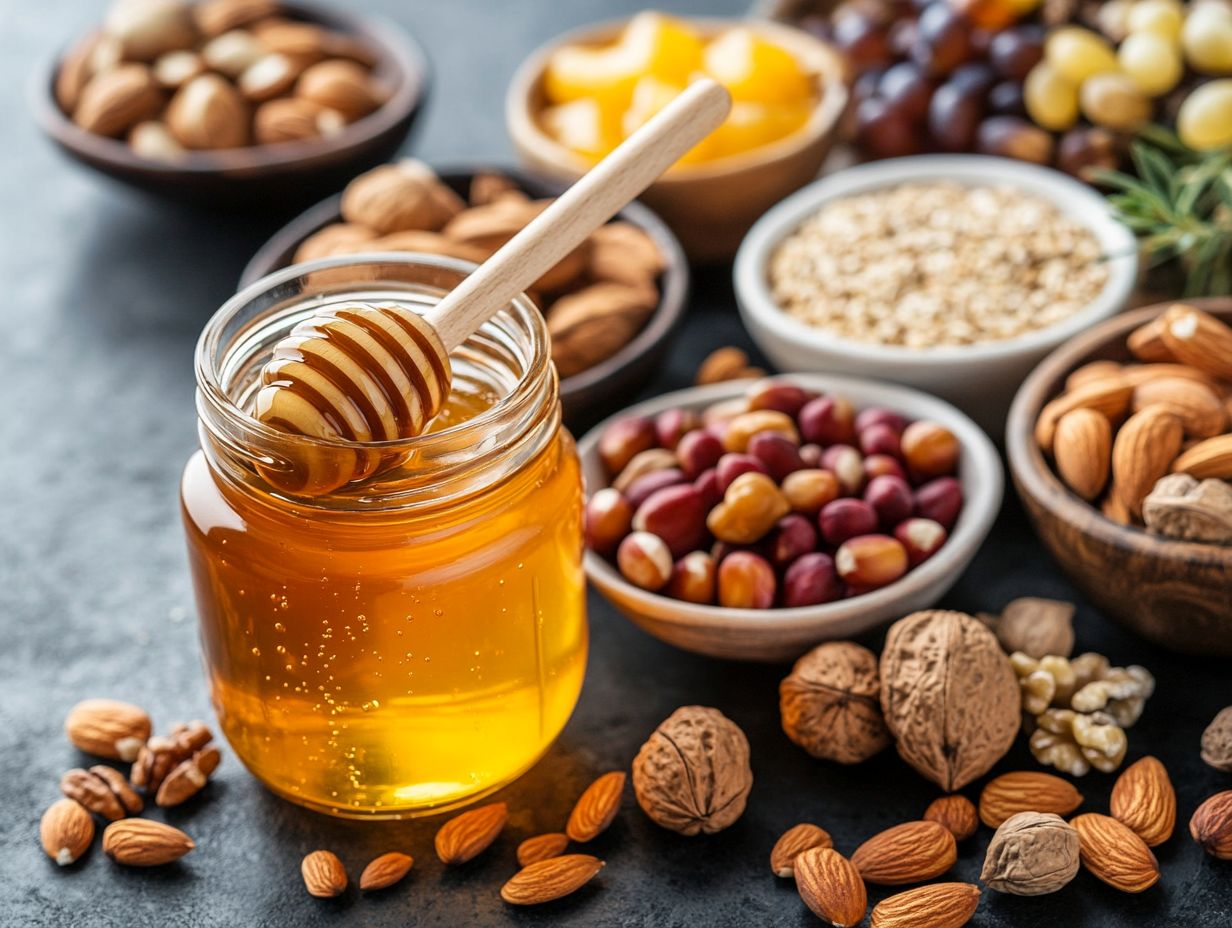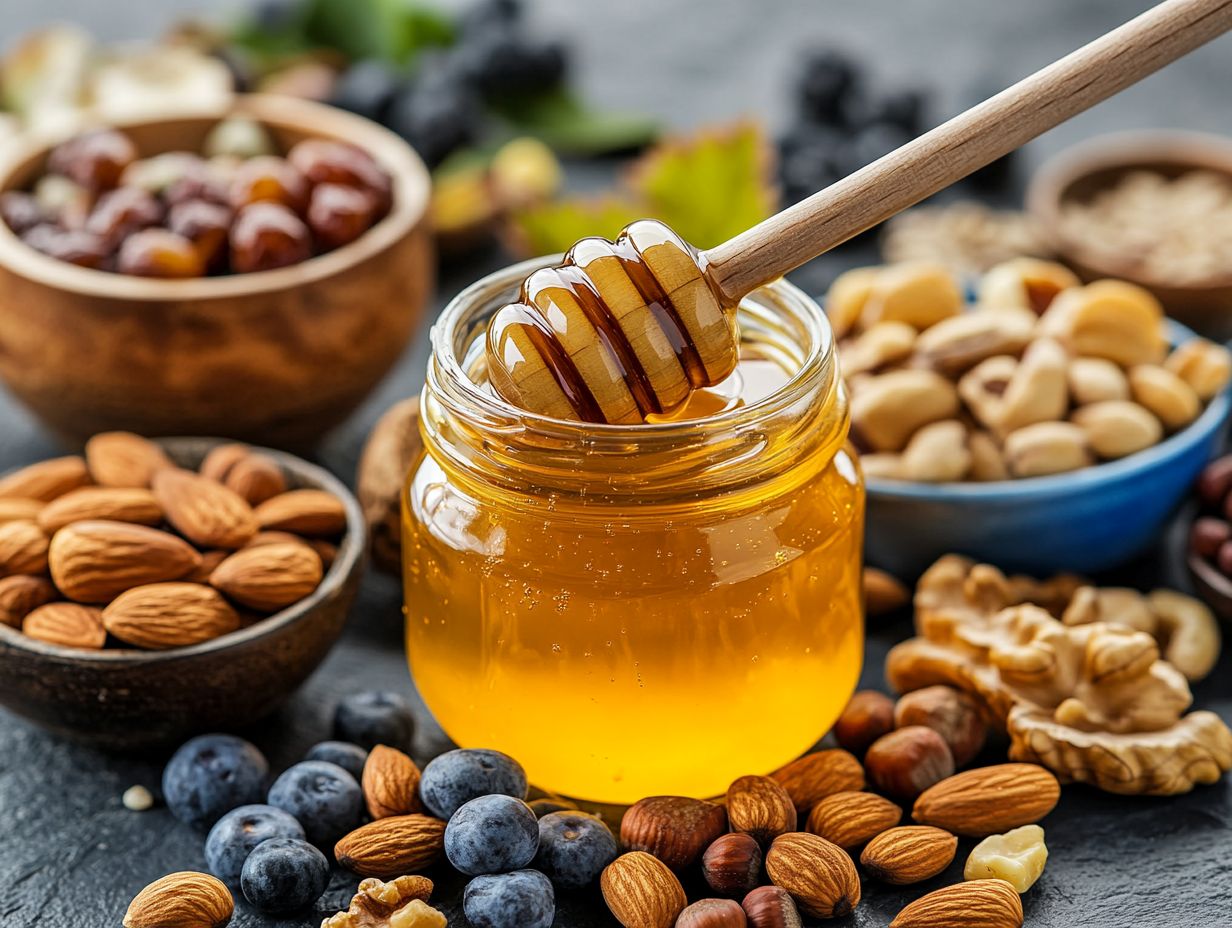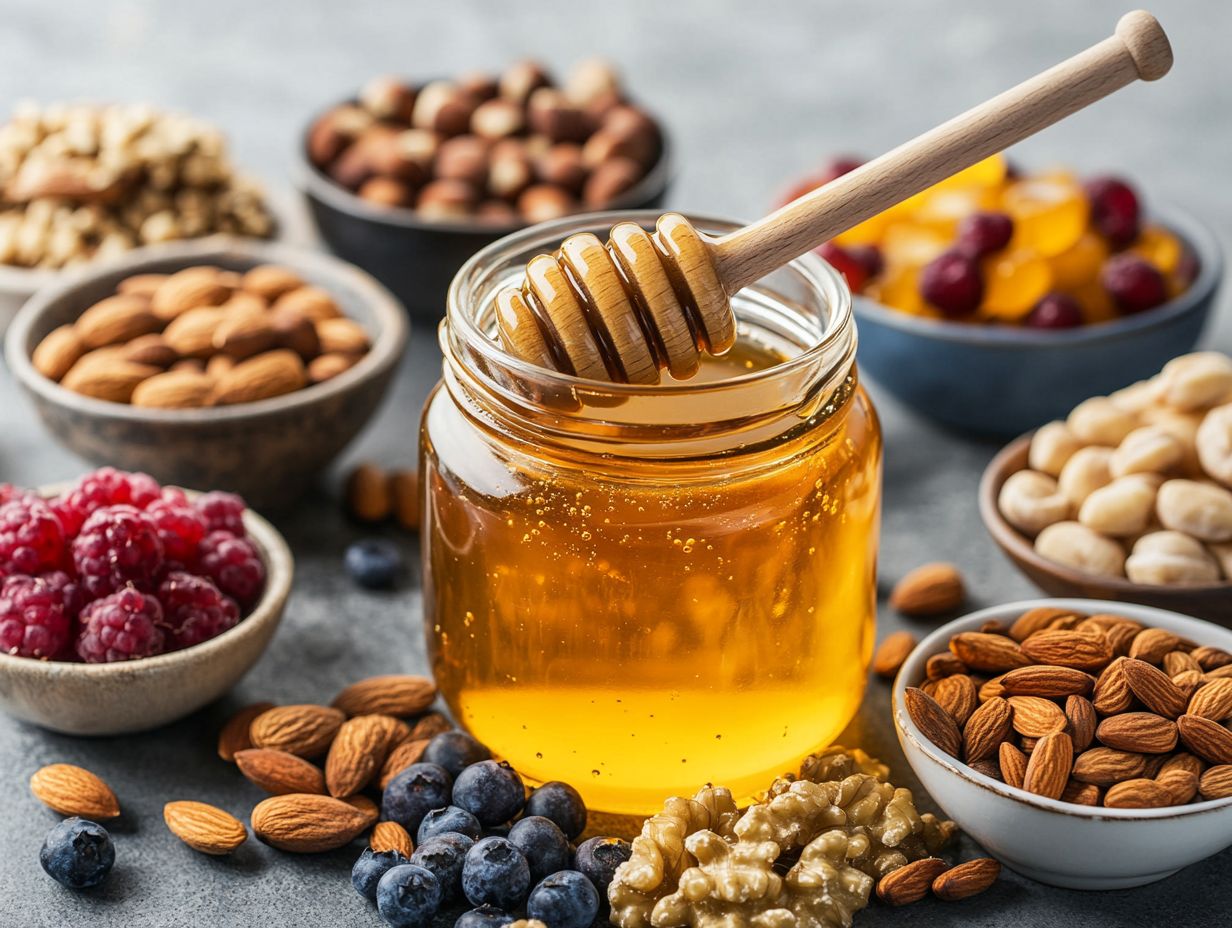5 Essential Nutrients Found in Honey
Honey is often celebrated for its delightful sweetness, but it also delivers a remarkable nutritional profile and numerous health benefits.
This golden nectar is rich in five essential nutrients vitamins and minerals, antioxidants, enzymes, amino acids, and phytonutrients all of which enhance its health properties and benefits.
Discover how these components support your body, explore the various types of honey (such as manuka honey and other honey varieties) and their unique nutrient profiles, and gain practical insights on how to seamlessly incorporate this natural sweetener into your diet.
Additionally, you ll delve into potential risks associated with honey consumption, including the need for moderation and the impact of crystallization on glucose and fructose levels. Learn how to select high-quality honey, whether it s raw honey or processed honey, ensuring you enjoy its benefits to the fullest.
By understanding the importance of bee colonies and the roles honeybees play in producing this liquid sugar, you gain a deeper appreciation for the honey remedies available. Honey is a versatile natural remedy that can tackle everything from soothing coughs to healing wounds!
Contents
Key Takeaways:

- Honey is a rich source of essential vitamins and minerals that support overall health and wellbeing.
- Antioxidants found in honey, such as flavonoids and polyphenols, can help fight off free radicals and protect the body from diseases.
- Enzymes, amino acids, and phytonutrients in honey provide numerous benefits, such as aiding in digestion, boosting immunity, and promoting wound healing and tissue repair.
1. Vitamins and Minerals in Honey
Honey isn t just a delightful natural sweetener; it s also a rich source of important vitamins and minerals that significantly enhance your overall health. These nutrients support bodily functions and promote your well-being. Studies from esteemed institutions like the Cleveland Clinic and WHO highlight that honey, particularly raw honey, possesses unique health benefits that processed alternatives simply can t match.
The American College of Nutrition emphasizes the importance of choosing high-quality honey. Experts such as Beth Czerwony stress that raw honey is brimming with vital nutrients, including B vitamins, vitamin C, and a range of minerals like calcium, iron, and magnesium. These elements play crucial roles in various bodily processes, from bolstering your immune system to supporting cellular function.
Furthermore, honey s potential for wound healing makes it a versatile substance. In contrast, processed honey often loses these beneficial nutrients during processing, resulting in a product that may be sweet but lacks health advantages. Thus, making an informed choice between raw and processed honey can have a significant impact on the nutritional profile you bring into your diet.
2. Antioxidants
Antioxidants are essential for maintaining optimal health, as they combat free radicals within the body. Honey stands out as an exemplary source of these beneficial compounds, boasting an impressive array of flavonoids and polyphenols. These antioxidants have been associated with a reduced risk of chronic diseases, including cancer, heart disease, and autoimmune diseases.
Research highlights that specific flavonoids present in honey, such as quercetin and kaempferol, demonstrate potent antioxidant activity, effectively neutralizing harmful free radicals. Polyphenols enhance honey’s unique health benefits by bolstering its anti-inflammatory properties. Numerous studies indicate that these antioxidants work together to inhibit oxidative stress and inflammation, which are key factors in the development of various diseases.
For example, clinical trials have shown that regular consumption of honey can significantly lower markers of inflammation and oxidative damage in the body, thereby supporting overall health and longevity. Why not try incorporating honey into your meals today and enjoy its delicious benefits?
3. Enzymes in Honey
Honey serves as more than just a natural sweetener; it boasts a wealth of enzymes that enhance digestion and elevate its health benefits, making it an exceptional addition to your balanced diet. Raw honey benefits include the preservation of these enzymes which are often lost in processed honey.
These enzymes amylase, invertase, and glucose oxidase play pivotal roles in breaking down carbohydrates. They help convert starches into sugars and facilitate energy use.
For instance, amylase starts the digestion process before food reaches your stomach. This can ease digestive burdens. Invertase aids in transforming sucrose into glucose and fructose, optimizing absorption efficiency. Meanwhile, glucose oxidase helps regulate blood sugar levels and contributes to antioxidant activity.
Together, these enzymes foster improved digestion and promote a more robust metabolic process that supports your overall health.
4. Amino Acids in Honey

Amino acids, the important parts of proteins, are found in honey and significantly contribute to its remarkable health benefits, including its potential for wound healing and tissue repair.
These natural compounds support metabolism, help make neurotransmitters, and regulate immune responses.
Research shows that certain amino acids, like proline, are great for collagen synthesis. This is key for maintaining skin integrity and facilitating healing.
Honey’s distinctive composition a harmonious blend of vitamins, minerals, and antioxidants enhances its efficacy in wound care. Studies suggest that honey can create a moist healing environment and boasts antibacterial properties, establishing it as a valuable natural remedy for burns and skin abrasions. The American Academy of Pediatrics also recognizes honey s potential in cough treatment.
5. Phytonutrients in Honey
Phytonutrients in honey provide many health benefits. Their anti-inflammatory properties help protect your body from chronic diseases.
These natural compounds, derived from various plants, combat oxidative stress and alleviate inflammation. For example, flavonoids a specific type of phytonutrient present in honey have demonstrated the ability to inhibit the production of pro-inflammatory cytokines. This effect can be especially beneficial for those grappling with conditions such as arthritis and cardiovascular diseases.
By incorporating these beneficial compounds into your diet, you can bolster your immune system and enhance your overall vitality. When consumed regularly, honey becomes a seamless addition to a healthy lifestyle, supporting improved inflammatory responses and contributing to long-term health benefits.
What Makes Honey a Nutrient-Rich Superfood?
Honey is considered a nutrient-rich superfood. It has a remarkable mix of vitamins, minerals, antioxidants, and other beneficial compounds. This makes it a fantastic and healthy alternative to regular sugar and a vital component of your optimal honey consumption.
The nutritional profile of honey differs based on whether you choose raw or processed varieties. Raw honey keeps most of its natural enzymes and nutrients, while processed honey tends to lose many of these valuable elements during refinement.
Leading health organizations, including the World Health Organization (WHO), emphasize honey’s potential benefits. It fits seamlessly into a balanced diet as a natural sweetener. With its antimicrobial properties and ability to deliver instant energy, honey emerges as an enticing choice for those in search of healthier alternatives, particularly given its significant role in promoting overall well-being.
How Do These Nutrients Benefit the Body?
Honey contains a range of diverse nutrients, including antioxidants, enzymes, and amino acids. These provide health benefits that support bodily functions and boost immunity.
Antioxidants, such as flavonoids and phenolic compounds, help protect your body from cell damage and inflammation. The enzymes found in honey assist with digestion by breaking down sugars, which can ease discomfort from digestive issues.
The amino acids in honey help with muscle recovery and enhance energy levels. Research suggests that regular consumption of honey can strengthen your immune function due to its antimicrobial properties that inhibit the growth of harmful bacteria.
With such an impressive nutrient profile, honey offers a delightful and natural way to elevate your health and wellness. Don t miss out on the incredible health benefits of honey! Start incorporating it into your daily routine today!
What Are the Different Types of Honey and Their Nutrient Content?

Exploring the world of honey reveals a delightful array of options, from raw honey to processed varieties and the renowned manuka honey. Each type presents a unique blend of nutrients and health benefits, so choose wisely for your optimal wellness.
Consider raw honey, for instance. This unprocessed gem retains its beneficial enzymes, antioxidants, and vitamins, significantly bolstering your immune system. While processed honey may still tickle your taste buds, it often undergoes filtering and heating, resulting in the loss of some natural goodness.
Manuka honey comes from the nectar of the manuka tree in New Zealand. It is known for its strong antibacterial properties and is often used for wound healing and soothing sore throats.
How Can Honey Be Incorporated into a Healthy Diet?
Adding honey to your diet is easy and truly rewarding! It s a delicious way to sweeten your meals while serving as a superior alternative to refined sugars.
For a delightful breakfast, drizzle honey over whole grain toast or oatmeal, and pair it with fresh fruit to boost your nutrition. Just a spoonful of honey can perfectly balance savory ingredients in marinades, adding a subtle sweetness to grilled chicken or roasted vegetables.
If you’re into baking, substituting honey for sugar in your recipes can result in a moister finished product. You might need to adjust the liquid ratios a bit, but moderation is key; aim for a teaspoon or two daily to savor honey s benefits without guilt.
Are There Any Risks or Side Effects of Consuming Honey?
Honey is generally safe and offers many health benefits. However, be aware of the risks that come with consuming too much or if you have certain health conditions.
Overindulging can lead to spikes in blood sugar levels, which is concerning if you manage diabetes or insulin resistance. Additionally, if you have pollen allergies or sensitivities, you might experience adverse reactions since honey can sometimes contain traces of allergens.
For those who are pregnant or for infants under one year of age, it’s crucial to steer clear of honey entirely due to the risk of botulism. Therefore, moderation is essential; incorporating honey sparingly into your diet allows you to enjoy its many benefits without compromising your health.
How Can One Ensure They Are Getting High-Quality Honey?
To enjoy high-quality honey, distinguish between raw and processed honey. Raw honey is the better option because it preserves more beneficial compounds.
Check labels carefully. Look for terms like 100% pure, raw, or unfiltered to ensure minimal processing.
Certifications such as USDA Organic also confirm responsible sourcing.
When visiting suppliers, ask about their sourcing practices. Inquire how they maintain their bee colonies and where the honey is harvested.
Choosing quality honey enhances your meals. It also offers a wealth of antioxidants, vitamins, and minerals.
Raw honey is honey that is unheated and unprocessed. In contrast, processed honey is heated and filtered, which can reduce its natural properties.
Frequently Asked Questions

What are the 5 essential nutrients found in honey?
The 5 essential nutrients found in honey are carbohydrates, proteins, vitamins, minerals, and antioxidants.
How do carbohydrates in honey benefit our body?
Carbohydrates in honey provide us with the necessary energy to fuel our daily activities and keep our body functioning properly.
What role do proteins play in honey?
Proteins in honey assist in building and repairing tissues in our body, as well as helping with enzyme and hormone production.
What vitamins can be found in honey?
Honey contains a variety of vitamins including vitamin C, B vitamins, and vitamin A, which are essential for maintaining a healthy immune system and overall well-being.
Why are minerals important in honey?
Minerals found in honey, such as calcium, iron, and magnesium, are essential for strong bones, proper nerve and muscle function, and maintaining a healthy heart.
How do the antioxidants in honey benefit our health?
Antioxidants in honey help to protect our cells from damage caused by free radicals, which can contribute to diseases like cancer and heart disease.
Don’t miss out on the benefits of quality honey discover your perfect jar today!




